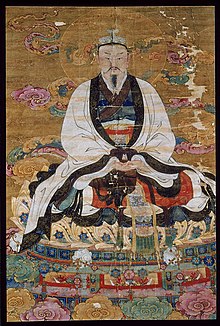Yu Di

Yu Di ( Chinese 玉帝 , Pinyin Yù Dì or 玉皇 , Yù Huáng ) A , the Jade Emperor , is one of the most important deities in Chinese mythology .
The Jade Emperor is worshiped as the main god in Daoism and is considered the highest principle of heaven. According to the Daoist view, the Emperor of China was considered the earthly son of the Jade Emperor ( 天子 Tiānzǐ , German , 'Son of Heaven' ).
cult
His cult was especially promoted in the 11th century by the Song Dynasty , and numerous temples were built for him. He is often depicted sitting on a throne in imperial dragon robes, the ceremonial table in hand. The Jade Emperor is one of the Three Pure Ones ( 三 清 Sānqīng ) who inhabit the three pure heavens.
Environment and function
In the 17th century BC, Emperor Cheng Tang destroyed the Xia dynasty and founded the Shang dynasty . At that time, the cult of the supreme god "Shangdi" (so his title) and ancestor worship moved closely together. The king, it was believed, received his ruling mandate from heaven and after his death returned to the side of the "Shangdi" and was therefore worshiped with him as the highest deity.
The Jade Emperor managed all heavenly and earthly affairs from his palace in heaven. He had ministers, a powerful pedantic administration, numerous staff, etc. and was thus a reflection of the Confucian system of state administration. From the bottom to the top of the social ladder reports were sent to his court, praise and blame were distributed, there were promotions and demotions, new gods replaced the old ones depending on their performance, a task which the earthly government of the emperor by decree (the In the end, the emperor decided on the “professional” career of the gods) or was perceived by Daoist priests, whose religious concepts, like those of Buddhism, had in the meantime partly merged with Confucianism, mainly in order to be able to clarify the metaphysical questions left open there (What did not succeed in the long term, see Neo-Confucianism ). Once a year, on New Year's Day , all the department deities reported to him.
jade
The title “Jade Exalted” is not accidental, because the high cultic esteem for jade is an essential part of Chinese culture . Already early and in the Neolithic it was believed that jade made it possible for humans to come into contact with the gods and it was used as a medium between the earthly and the supernatural sphere. Beyond this magical aspect, it was associated with the idea of purity, beauty and sublimity. Jade was also considered to be the embodiment of the light, male Yang principle within the Yin-Yang duality, and it was the symbol for life force. Above all, the identification of jade with the masculine principle should have a direct effect on the later connection between ruler and jade. The name Jadekaiser is, however, further evidence of its Confucian origin for other reasons, because in Confucianism there was a jade cult from early on, from which a proper jade ethic developed, the core sentence of which was: "The noble compares his virtue with jade" . A relatively rigid ceremonial jade system then emerged from this ethic as a late symptom.
- annotation
literature
- GJ Bellinger: Knaur's Lexicon of Mythology. Weltbild, Augsburg 2001, ISBN 3-8289-4154-0 .
- C. Blunden, M. Elvin: World Atlas of Ancient Cultures: China. 2nd Edition. Christian Verlag, Munich 1985, ISBN 3-88472-091-0 .
- R. Cavendish, TO Ling: Mythology. An illustrated world history of mythical-religious thought. Christian Verlag, 1981, ISBN 3-88472-061-9 .
- F. Comte: Myths of the World. WBG, Darmstadt 2008, ISBN 978-3-534-20863-0 .
- Monika and Udo Tworuschka (eds.): Religions of the world in past and present. Bertelsmann, Gütersloh 1992, ISBN 3-8094-5005-7 .
- Yang Yang: The Origin of the Chinese Jade Culture. In: Ancient China. People and gods in the Middle Kingdom. Exhibition catalog of the Kulturstiftung Ruhr. Essen 1995, ISBN 3-7774-6640-9 .
Web links
Individual evidence
- ^ Term Yu - 玉. In: leo.org . Retrieved July 20, 2020 (Chinese, German).